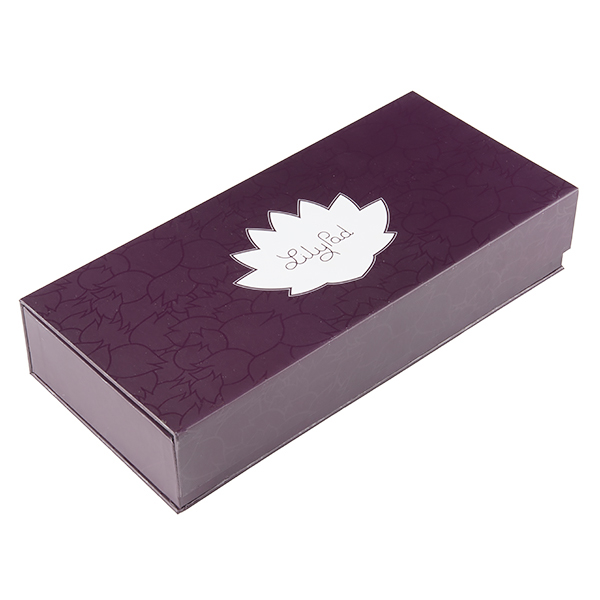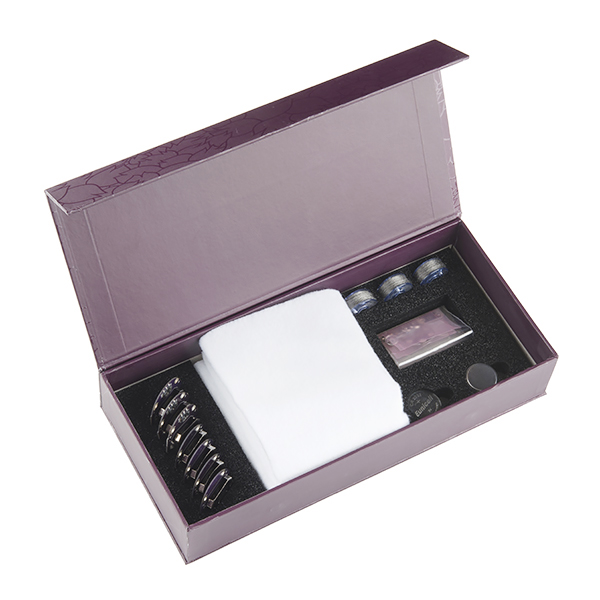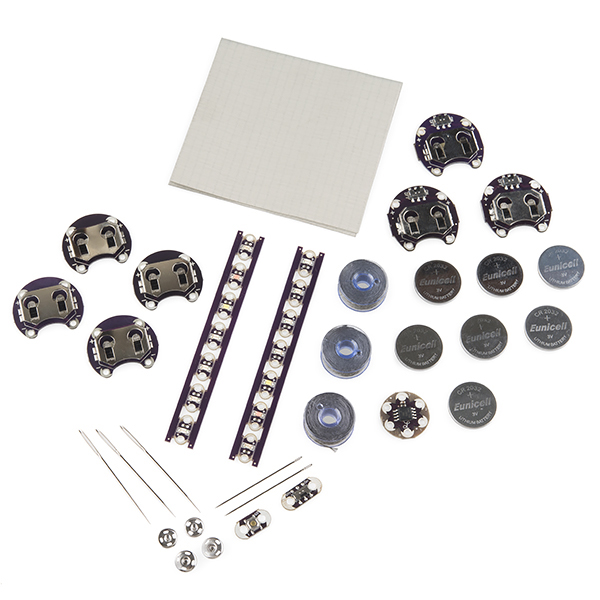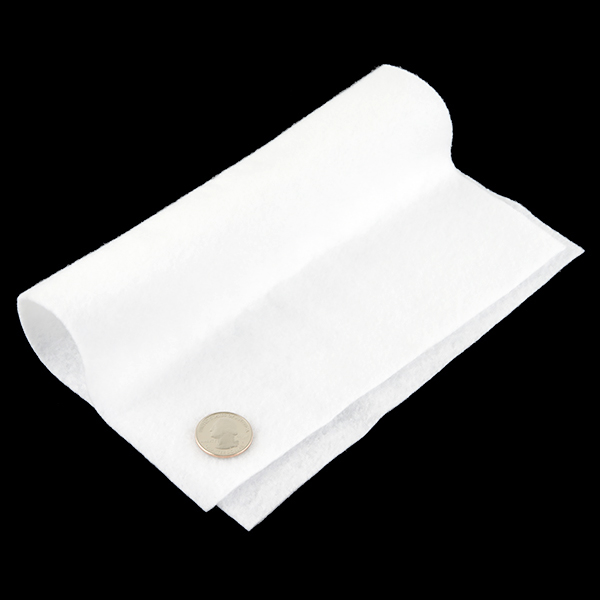LilyPad Design Kit
The LilyPad Design Kit (LDK) is a great way to get started with e-textiles. The LDK includes everything you need to complete 6 simple experiments that will teach you how to sew basic circuits, light LEDs, create interactive designs, and more. You don't need any previous sewing or electronics experience to use this kit. If you've ever been curious about getting into e-textiles but have never known where to start, this is where you can begin!
The online LDK Tutorial contains step by step instructions of how to connect each circuit with the included parts. Tips and tricks are provided and explained and even includes troubleshooting tips if something goes wrong. A link to this tutorial can be found in the Documents section below. The kit does not require any soldering and is recommended for beginners of any age that can can hold a needle.
LilyPad is a wearable technology developed by Leah Buechley and cooperatively designed by Leah and SparkFun. Each LilyPad was creatively designed to have large connecting pads to allow them to be sewn into clothing. Various input, output, power, and sensor boards are available. They're even washable!
Note: A portion of this sale is given back to Dr. Leah Buechley for continued development and education of e-textiles.
Note: Due to the requirements of shipping the batteries in this kit, orders may take longer to process and therefore do not qualify for same-day shipping. Additionally, these batteries can not be shipped via Ground or Economy methods to Alaska or Hawaii. Sorry for any inconvenience this may cause.
- 1x LilyPad Parts Box
- 1x Felt Sheet - 9" x 12"
- 1x Conductive Fabric - 6" x 6.5" Ripstop
- 1x Needle Set
- 3x Conductive Thread Bobbin - 30ft (Stainless Steel)
- 4x SimpleSnap (2 Male, 2 Female)
- 7x Coin Cell Battery - 20mm (CR2032)
- 1x LilyTiny
- 1x LilyPad Slide Switch
- 1x LilyPad Button Board
- 1x LilyPad Rainbow Led Strip
- 3x LilyPad Coin Cell Battery Holder - Switched - 20mm
- 4x Lilypad Coin Cell Battery Holder - 20mm
- Experiment 1: Lighting a Basic Circuit
- Experiment 2: Multiple LED Circuits
- Experiment 3: Buttons and Switches
- Experiment 4: Make Your Own Button
- Experiment 5: Make your Own Switch
- Experiment 6: Microcontroller Circuits
LilyPad Design Kit Product Help and Resources
Core Skill: DIY
Whether it's for assembling a kit, hacking an enclosure, or creating your own parts; the DIY skill is all about knowing how to use tools and the techniques associated with them.
Skill Level: Noob - Basic assembly is required. You may need to provide your own basic tools like a screwdriver, hammer or scissors. Power tools or custom parts are not required. Instructions will be included and easy to follow. Sewing may be required, but only with included patterns.
See all skill levels
Core Skill: Electrical Prototyping
If it requires power, you need to know how much, what all the pins do, and how to hook it up. You may need to reference datasheets, schematics, and know the ins and outs of electronics.
Skill Level: Rookie - You may be required to know a bit more about the component, such as orientation, or how to hook it up, in addition to power requirements. You will need to understand polarized components.
See all skill levels
Comments
Looking for answers to technical questions?
We welcome your comments and suggestions below. However, if you are looking for solutions to technical questions please see our Technical Assistance page.
Customer Reviews
4.1 out of 5
Based on 7 ratings:
2 of 2 found this helpful:
Great Introduction
While the LilyPad Design Kit is a great introduction to circuits and working with LilyPad e-textiles, the projects could be a bit more practical or useful. It's always fun to make something you'll be able to use later (a light up pin? an embroidery? a t-shirt design?) rather than just laying it all out in felt for no reason other than to learn. The instructions are simple and clear. You just have to get creative with how you implement the exercises if you want your end product to be useful.
Love it, but programmer wants more
I love how easy this technology can be for an experienced seamstress and engineer! The design kit and the online picture experiments were very user-friendly. If you are very inexperienced in either sewing or circuits, than it is definitely a good level of kit for you. I also like that if you want to teach basic circuits, all you would have to do is remove the thread when finished, no de-soldering or rounding up breadboards and jumper wires. I noticed that the sewing gets the students to slowdown and check their work before blowing out the circuits by quick power ups since they "worked so hard" to make the circuits. The downside to the kit is that it is too easy. I would like to see the kit come with an LilyTiny reprogramming experiment, including the ic test clip cable, jumpers and the tiny avr programmer. Or better yet, include the LilyPad Arduino USB in a more advanced kit. Regardless, this kit got me and my bio-engineering students interested in many different wearable sensor applications!
Love this
This kit is a big help to me as I am np making several projects to display in my classroom.
Eventually got me Going on LilyPad Technology
The set was a head-scratcher for me at first, as it did not actually come with a LilyPad Arduino. Eventually I learned to appreciate all of the components provided, and I use them in many of my wearable and non-wearable projects. I now realize the LilyTiny is really a very handy small, programmable Arduino that can do most of my projects. Did have to later purchase the LilyTiny programming tools.
E-textiles = Excellent textiles
I have purchased this kit in preparation for a workshop on Etextiles. Having worked with SparkFun, shoutout to Brian, at the recent Microcontrollers for Educators programme I am fired up and ready to deploy this kit.
great for learning
I already sew and have basic knowledge of circuitry, I had been intending to combine the two forever, but couldn't quite get organized enough to source components and sit down and teach myself. I was very pleased with the intro kit & online instructions.
Fun
My wife is enjoying the kit. Has everything you need and the instructions are very thorough.





why so many batteries/holders and just one lilypad? You cant build more than one eTextile smart item. Ok you can sew up several that are simple on/off led designs... gets people past that hurdle, but Seems to me you'd get more learning milage out of the Protosnap Lilypad Dev Board, for less cost. maybe its just more experience with the sewing circuits aspect? Granted the coin cells and holders are inexpensive, but I'd drop some and add some sensors... or just stick with the https://www.sparkfun.com/products/11262
The kit is designed to walk through a specific set of experiments, and includes the parts necessary to complete them without tearing apart any of the circuits to reuse the parts. I completely agree that if you're ready to start programming and using sensors, the ProtoSnap Dev Board is the way to go, but this kit is a precursor to those skills. It walks a beginner through the basics of circuit building and sewing in preparation for those more complicated circuits! You can find the experiments the kit is built around here
Reading the experiments I see the progression and value of these. This is the basic Introduction to Sewing Electronics pack, where the ProtoSnap Lilipad is the intro to programming. The pairing of these, plus a few other sensors/lights/motors would make a great materials pack for an introduction to eTextiles course series.